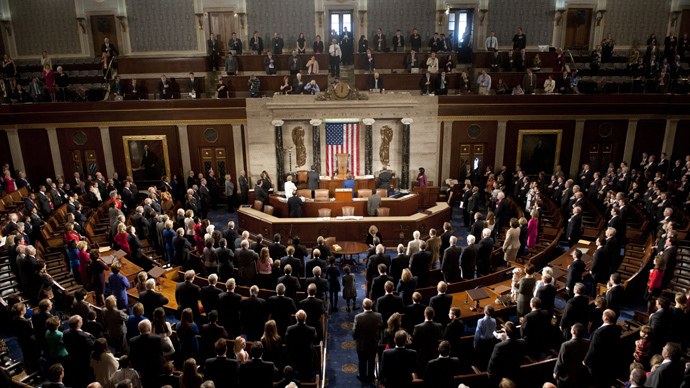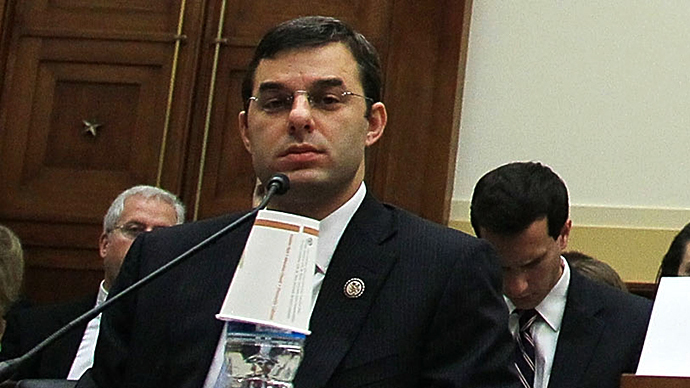House rejects NSA spying restrictions after White House outcry

The US House of Representatives voted on Wednesday to reject an attempt to reign in domestic spying by the National Security Agency following a storm of lobbying by the White House against the measure.
In a 205-217 vote the House defeated an amendment introduced by
Rep. Justin Amash (R-Michigan) which would have prevented the NSA
from collecting the phone data of individuals not currently under
investigation.
Amash aimed to challenge the NSA’s program of widespread
collection of phone records, specifically information known as
'metadata,' the details
of which were revealed by The Guardian in June.
That newspaper was able to acquire and publish a copy of a top-secret Foreign Intelligence Surveillance Court opinion which required the mobile carrier Verizon to provide the NSA with the phone numbers of both parties involved in calls, along with the time and duration of the calls as well as calling card numbers used, and the International Mobile Subscriber Identity (IMSI) number for mobile carriers.

Since that information was revealed, officials have both
confirmed the authenticity of the leak and justified its actions,
as well as suggested that many more telecom companies are
involved.
Surveillance of phone communications was itself eclipsed by revelations then made by former NSA contractor Edward Snowden, who blew the whistle on an unimagined level of online surveillance being conducted by the intelligence agency in conjunction with a long list of major American companies, including Yahoo, Microsoft, Google and Facebook.
According to various experts on the matter, including analysis
provided by Wired Magazine, the NSA’s indiscriminate collection
of such data would thereby allow the government to build a
massive database to map connections and relationships between
callers.
The defeated amendment would have ended the statutory authority
of the newly revealed spy program, as part of the $600 billion
Department of Defense Appropriations Act of 2014.
“The government collects the phone records without suspicion
of every single American of the United States,” said Amash
during floor debate on the measure.
On Monday, both the White House and lawmakers who support the
NSA’s domestic spying programs launched a major lobbying effort
against Amash’s measure after it was granted a vote.
Director of National Intelligence James Clapper released a
statement on Wednesday against the amendment, saying it risked
“dismantling an important
intelligence tool.”
The day prior, White House Press Secretary Jay Carney had issued
a statement announcing the White House’s opposition to the
amendment.
“We oppose the current effort
in the House to hastily dismantle one of our intelligence
community’s counterterrorism tools,” Carney said.

Democratic Representatives John Conyers and Zoe Lofgren had sent
a letter to colleagues Wednesday urging them to support Amash’s
amendment.
“Congress did not intend for
Section 215 of the Patriot Act to allow the bulk collection of
information about all Americans,” wrote the two.
“This amendment would not
prohibit the government from spying on terrorists under Section
215, or from collecting information in bulk about American under
other legal provisions.”
The authority for the NSA’s spying programs are based on a
provision of the PATRIOT Act, known as section 215, which allows
the secret Foreign Intelligence Surveillance Court to authorize
broad warrants for phone records deemed “relevant,” but not necessarily
connected to terrorists.
Pete Ashdown, the founder and CEO of Xmission, an Internet service provider that has denied NSA surveillance requests, told RT that the only way to avoid government monitoring is for an Internet user to encrypt their activity and hope their provider complies.
“I want to hope something good is coming out of Washington,” he said. “There are many in Congress who are calling Edward Snowden a traitor and criminal when in fact I think it’s the people in the NSA who are criminals for not following the Constitution and have perjured themselves in front on Congress. These are people we cannot trust and its time we audit them or shut them down. I don’t envision the wholesale surveillance of Americans they’re doing as part of my America.”














